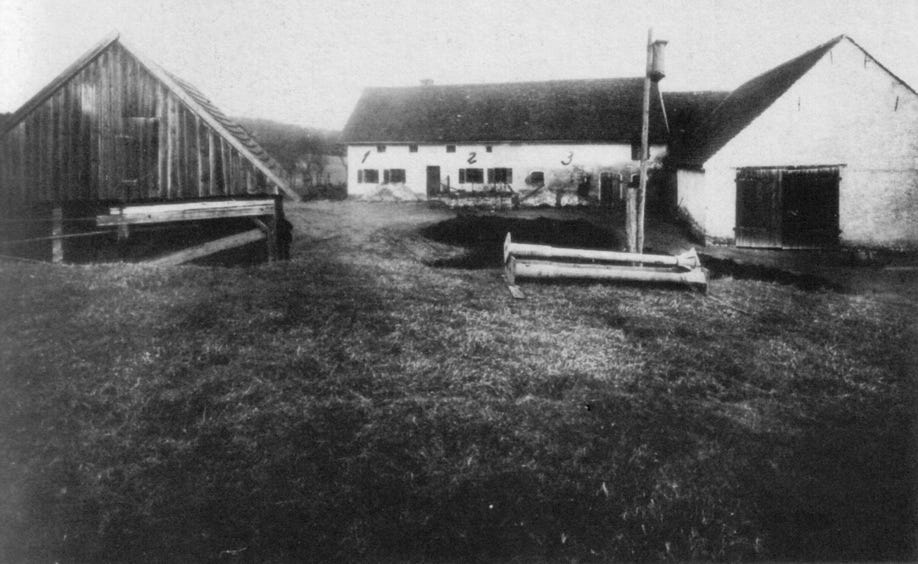This is not going to be another mystery post, or one regaling you with stories. Instead, we are going to talk about being okay with not knowing.
That is the Flannan Isles Lighthouse. It’s quite famous because three lighthouse keepers that were tending it disappeared without a trace. They recorded in their logs a monstrous storm that proceeded their disappearance, but nothing was ever seen of the men again. No one has any idea what happened to them. There’s a movie about it, but it’s dreadful so I recommend skipping it, and there are plenty of videos that are searching for a clue as to what could have gone wrong causing them all to vanish.
Guess what? No one will even know what happened to them. Save for time travel being invented, these men are lost to time, and while their story is very interesting and allows us to get that “Ooooo, creepy,” vibe tickled, they are gone forever, and no amount of speculation is going to answer why.
See this place?
That is the Hinterkaifeck farm. In 1922 every single resident of that farm was brutally murdered, including two young children. Prior to the murders their long-time, live-in maid quit. She said it was haunted, had made the homeowner aware of her concerns which he investigated and found nothing, had enough, and left.
Andreas Gruber, the owner of the farm and a whole piece of work himself, also noted to a neighbor that he found footprints in the snow leading onto his property, and none leaving. He investigated again, and found nothing. He also heard noises in the attic where the maid had complained about hearing them. When he looked in the attic when she told him about it, he found nothing. When he looked again he found a current newspaper and evidence that perhaps someone had been up there. Again, he never found an actual person, just hints that something was amiss.
Six months later a replacement maid began her duties at the farm. The murders happened the day after she arrived. What makes this unsolved mystery even more interesting is that whoever committed the murders did so by bringing the family members one by one into the barn and bludgeoning them to death, save for the youngest that he killed in the house. Mind you, I say ‘he’, but no one actually knows. The only suspects were male, so ‘he’ it is.
Even more interesting than somehow bringing them all one by one to the barn without anyone putting up a fight or alerting any of the still living members of the household was that the killer then proceeded to live at the farm in the house, for six days after the killings. How do we know this? There was smoke coming from the chimney every day, and the killer also tended to all of the farm animals.
Another interesting detail was that when they were investigating the killings they thought it possible that there were two different killers because they thought two different weapons were used based on the wound pattern. They also thought that they had identified the weapon, but decades after the murders there was excavation done on the property (the farm was torn down shortly after the murders), and a weapon that matched all the wounds was found in the moved earth. There is no one left to compare any possible prints found on it, and even if there were, it has been in the ground so long, the prints would have long deteriorated.
There were plenty of suspects, again, Andreas Gruber was a piece of work, but none panned out and no one was found to be the perpetrator. These murders will remain unsolved likely forever. We will never know why, nor who, or how long they lurked in that farmhouse with the family before killing them. It’s creepy, I get it, but that is all it will ever be. It will never be solved because everyone that might know something is long dead.
The Gruber family and the lighthouse tenders are lost to time. For many people that gives them a disquiet that makes them uneasy. They feel unsettled that something like this can occur and no answers will ever be arrived at. This unease lurks in many places in life, and not knowing can be difficult. It is one thing to examine cases from the past. They are interesting, but they aren’t related to you as an individual. There are plenty of unknowns that humans grapple with every day. Some really can be troublesome, and others are just a part of life that is accepted as normal.
What separates them? I have been wondering about this recently. For me, knowing whether or not God exists is as disquieting as whether or not I will have time to do any writing on any given day. The answer to both is the same as well. I will know when I get there. There is no difference in the gravity of either. They are just unknowable things that don’t change regardless of my investment in their outcome.
Most people are not like this. They worry about unknowable things, and sometimes they do so to the degree they disrupt their lives. Usually, they are pretty big things like, what happens after we die. I know that is a large one because I am frequently asked whether or not I fear death. I don’t, and that usually brings about disbelief in that person, or them wanting to know why death doesn’t bother me.
The fear of death is one that I have never understood. I believe it comes from the fear of no longer existing, and not knowing what comes next. I am not concerned with what comes next. I have no way of knowing, so it doesn’t occupy my time. As for the fear of death, I don’t remember the time before I was born, so why would I assume that death will be any different. If it is, cool. No matter what, it’s bound to be interesting if it is anything at all.
Worrying about things that you can not know the answer to doesn’t change the fact you aren’t going to know. It can be difficult to settle into that blank line where the explanation should reside. Humans like knowing things, and because they like knowing things, and because what they believe defines how they live, humans are truly excellent at filling those blanks in with assumptions that stand in place of facts.
Of course, you can see this sort of behavior in religious practices, but even in more mundane things, such as assuming the motivation for someone’s behavior that you don’t understand. Why would they do or act in a certain way? The mind is motivated to understand that person’s actions because they are unsettling to not know why something went the way that it did.
A few years ago over on Quora, I answered a question that asked about the motivations of a mother who I believe stabbed both her daughters. I’m not entirely certain, so don’t quote me on that. I can’t find the question now, and can’t recall enough of what I write for the search feature over there to be useful.
This question was asked literally within hours of the news regarding the incident. People were rushing to fill in the blanks as to why this woman would do something so horrible? I get it, it is unsettling when a woman attacks her own children. There could be a thousand reasons why it happened, and none of them have been uncovered hours after the crime. Investigations take a good amount of time, and surmising her motive isn’t an answer to the question. It’s just providing false information to satisfy the dispelling of the unknown, even if it isn’t remotely accurate.
Not knowing something is okay. There isn’t going to be a test, and even if there was, the person giving it doesn’t know either, so a big load of good that would do.
Why do people do what they do?
What comes next, after this life and this place?
Is there a God?
What exists around us that we cannot see?
Ever see one of these cameras?
That image is from an SLS camera that supposedly can see what we cannot. Is it actually picking up spirits? I have no idea, and really, it doesn’t matter past being curious if it does. If you knew that it absolutely did pick up ghosts, how would this change anything in your life?
If you were sitting our your living room watching TV in the house alone, you know you are alone, and you know that there is nothing weird happening around you, but then you decided to switch on one of these cameras and saw a stick figure, plain as day, sitting next to you on the couch, how would you react?
What if you checked, and every day it was there, appearing to watch TV right next to you? Or better yet, it’s late, and time for bed. You switch off the TV, and in the black screen reflecting back at you is this:
You’re alone, remember? So who is that?
Here’s the thing, you aren’t going to find out, and just because you had the chance to see it doesn’t change the fact that it was probably there next to you the entire time. Are you going to pack up and move away? Why? You wouldn’t be able to know if there was someone else sitting next to you in the next place.
People want and need to know things that aren’t within our capability of knowing. Even if finding out those things doesn’t make life any easier. Are you going to be thinking about that image next time you are alone and watching TV? Will it inspire fear? Why? It’s because that black shape is unknowable. You have no idea what it is, what it can do, what it wants. Chances are, it just wants to watch TV. Maybe it likes Vikings too. However, because seeing that black unidentifiable shape suddenly sitting next to you, your brain that dislikes not knowing is going to assign a huge number of assumptions about its intent.
Moving house is expensive. Hope it doesn’t follow you.
Weird things happen all the time around me. I don’t need to know why, I can just appreciate them for being strange and interesting. The other night someone knocked on the side of our house. No one was there, not even the dog heard anything, but the knock was distinct and clear. Three times, each with a pause in between just to be sure we knew it wasn’t something falling.
One night a good while back I was outside and I heard “meow” from the woods, but not a cat meowing, but the word said, “meow”. It wasn’t a regular voice either. It was mechanical, like that from a throat box that is given to people that have lost the ability to speak normally. Strange for certain, and no, I have no idea what it was. I’m still here. Nothing broke into the house and murdered us while we slept, so all I have is a strange incident that I will never know what caused it.
I’m good with that. Besides, the strange things are always fascinating. They give me experiences that otherwise, I wouldn’t have. Maybe when I do die I will find out all the secrets of the universe and will understand what said “meow” behind our house in the dark trees. Probably not though, and that’s fine.
What about you? Can you live without knowing the unknowable? If you can, life will be more interesting. I think the less you try to shove things into an understandable box, but rather allow them to be things that you aren’t sure the cause of, you will be more aware of things that other people miss. I think that a lot of people’s brains are constantly doing busy work, and that noise drowns out a lot of the world around them.
I could be wrong though. There’s plenty I don’t know.







I've noticed that it's not just that people don't like ambiguity but they also vigorously attempt to fit things into an existing theory. It is like someone who is trying to assemble a jigsaw puzzle and if they find an odd piece rather than toss it they whittle it into a shape that fits an existing space and will paint it if necessary.
I think there are a few points being discussed here, rolled into one. The first is the importance of leaving room for ambiguity which I absolutely agree with. Saying we're 80% sure rather than 100% leaves room for learning.
As far as things being unknowable, some things we'll never know. But those are the outliers. A lot of times we invest time and attention and figure out a likely tentative pattern. "Does God exist" is hard to know. "Is prayer the most effective response to the problems in my life" is more testable. We may focus on our failures, but we have a lot of successes, too. And maybe people have trouble judging what is important. Our tribal brains easily confuse some crime that happened 100 years ago in England with something that happened down the street. Maybe this is because, in the past, if we heard a story then it was relevant to our lives. i.e. The Availabilty Heuristic. If we can recall something, then we tend to believe that it's relevant. Airplane travel is safer than driving. But crashed airplanes make the news. They're potentially more memorable. So some people are more nervous about flying than driving.
Also, there's the human tendency to bias our pattern recognition towards recognizing ambiguous patterns as 'people' rather than things. And this makes some sense. We're more likely to be helped or hurt by people than by things, so we get a little boost of attention when a pattern comes close to being a face. And people talk about 'The man in the Moon.' We see faces everywhere. This is a face;
:-)
Two dots and two lines, that's all it takes.